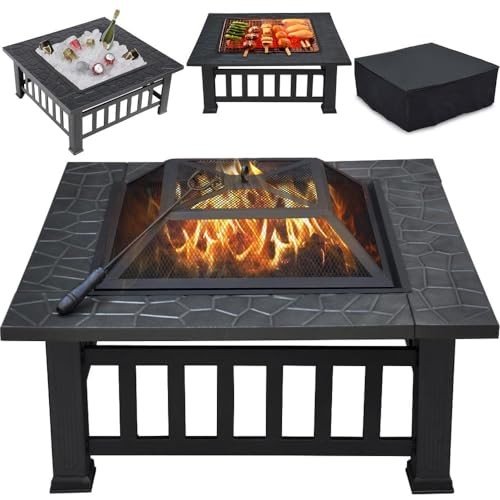This Is A Best Fireplace Success Story You'll Never Remember
The Best Fireplaces: A Comprehensive Guide for Homeowners
Fireplaces have actually long been a precious feature in homes, providing both heat and an inviting environment. They are available in different styles, sizes, and fuel types, permitting homeowners to select one that fits their individual visual and heating requirements. This short article explores the very best fireplaces, highlighting crucial features and factors to consider to assist you make a notified decision.
Kinds of Fireplaces
Comprehending the different kinds of fireplaces is crucial in choosing the best alternative for your home. Below are the most commonly used fireplaces:
Wood-Burning Fireplaces
- Benefits: Traditional appeal, natural ambiance, and effective heating.
- Drawbacks: Requires routine maintenance, ash disposal, and is subject to local policies regarding emissions.
Gas Fireplaces
- Benefits: Convenient, clean-burning, and simple to operate.
- Drawbacks: Requires a gas line, can be more expensive to install initially.
Electric Fireplaces
- Benefits: Easy setup, low upkeep, and the best option for homes with children or pets.
- Downsides: Lack the genuine feel of wood or gas flames, might not heat large spaces efficiently.
Pellet Stoves
- Benefits: Eco-friendly, efficient, and provide a consistent heat output.
- Downsides: Requires electrical energy to run, and pellet supply can be restricted in some locations.
Ethanol Fireplaces
- Benefits: No chimney needed, portable, and eco-friendly.
- Drawbacks: Generally less effective for heating.
A Comparison of Fireplace Types
Type
Installation Cost
Running Cost
Heat Output
Maintenance
Environmental Impact
Wood-Burning
₤ ₤
₤
High
High
Moderate
Gas
₤ ₤ ₤
₤ ₤
Medium-High
Low
Moderate
Electric
₤
₤ ₤
Low
Really Low
Low
Pellet
₤ ₤
₤
Medium
Medium
Low
Ethanol
₤ ₤
₤ ₤ ₤
Low
Very Low
Extremely Low
Top Considerations When Choosing a Fireplace
When you're in the market for a brand-new fireplace, keep the following elements in mind to guarantee you select the very best one for your home:
Purpose and Functionality: What do you desire your fireplace to do? Is it for heating or aesthetics? This will assist your choice significantly.
Area Availability: Measure the location where you wish to set up the fireplace. Make sure the chosen type fits without frustrating the space.
Fuel Source: Assess the schedule and cost of various fuel sources in your location to avoid unexpected expenditures.
Installation Complexity: Some fireplaces might need significant alterations to your existing home structure.
Structure Codes and Regulations: Be mindful of regional laws concerning ventilation, security, and emissions, as these can influence your fireplace choice.
Visual Appeal: The style and design of a fireplace can work as a focal point or enhance the existing design, so pick one that enhances your home's general aesthetic.
Advantages of a Fireplace
Including a fireplace to your home pays for numerous advantages:
Enhanced Aesthetic Appeal: A fireplace can raise the decoration of any room, producing a cozy and inviting environment.
Increased Home Value: A well-installed fireplace can add substantial worth to your home, making it interesting prospective purchasers.
Energy Efficiency: Modern fireplaces, especially gas and pellet ranges, can supply efficient heating while minimizing energy costs.
Emergency Heat Source: In cases of power failures, a wood or gas fireplace can serve as a dependable heat source.
Celebration Space: Fireplaces frequently end up being the centerpiece for events, promoting warmth and convenience during friend or family' get-togethers.
Frequently Asked Questions (FAQs)
**Q: How much does it cost to install a fireplace?A: Installation expenses can vary significantly based on the type of fireplace, structural requirements, and labor costs. Basic electric fireplaces may cost around ₤ 300, while customized wood or gas fireplaces can range from ₤ 3,000 to upwards of ₤ 10,000. Q: Are electric fireplaces safe?A: Yes, electric
fireplaces are typically safe.
They do not release carbon monoxide gas and have no open flames. They often consist of safety features like automated shut-off mechanisms. learn this here now : How typically must I have my chimney cleaned?A: If you use a wood-burning fireplace, it's suggested to have your chimney cleaned up at least as soon as a year
**
to prevent creosote buildup, which can lead to chimney fires. Q: Can I install a gas fireplace myself?A: It's not suggested to set up a gas fireplace without professional support due to the intricacies associated with gas
lines, ventilation, and safety policies. Q: What are the best kinds of fuel for wood-burning fireplaces?A: The best fuel options consist of well-seasoned woods like oak, maple, or hickory, as they burn hotter and cleaner compared to softwoods. Selecting the very best fireplace for your home
includes thinking about many factors, from visual appeals to function and safety. Each type of fireplace has its unique advantages and potential downsides.
Comprehending these aspects, in addition to your individual heating needs and budget plan constraints, will guide you in making a notified decision. Eventually, a fireplace can offer not only heat however likewise a rich atmosphere, transforming your home into a welcoming sanctuary. 